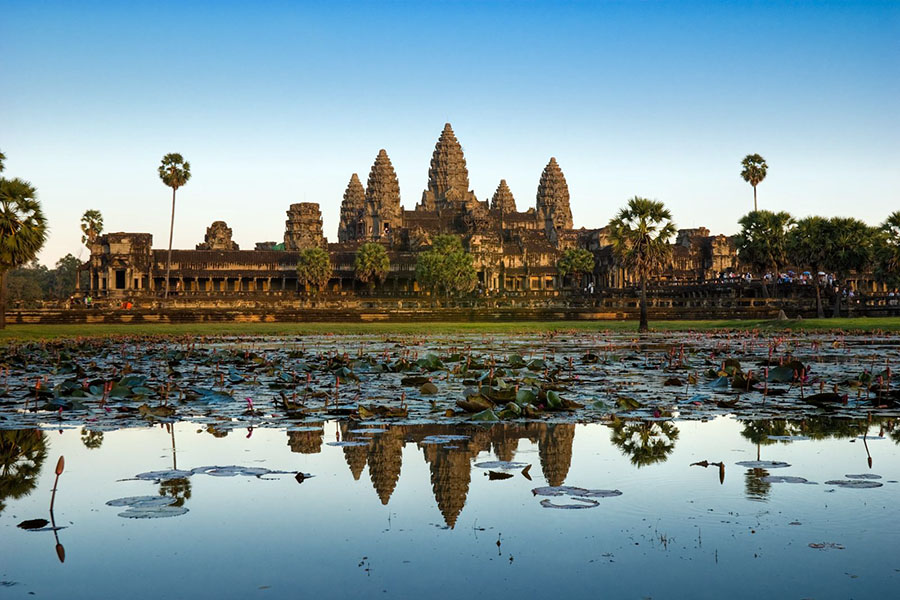Cambodia is a region with an extraordinary cultural tradition that has no reason to envy nearby Thailand, Laos and Vietnam. However, having undergone decades of war and isolation, the country has suffered instability and at times its name is associated with the words “atrocities” and “persecution”.
Today these words are slowly giving way to tourism, and the country has become a destination for thousands of tourists that especially flock to the temples of Angkor.
Besides a visa “on arrival” you can also get a visa at one of the Cambodian embassies or consulates abroad (for America it’s handled in Washington and in Europe in Brussels, Paris, London and Berlin), or online.
What documents are needed to enter Cambodia

First of all you’ll need a passport valid for at least six months from your date of entry in Cambodia.
Make sure that you have at least two blank pages in your passport, one for the stamps and another for the visa. If you go directly to the embassy, you should also attach a photocopy of the passport page with your photo and information.
You’ll also need an application filled out and signed for each passport (the form can be downloaded online on the site for Cambodian world embassies) and a recent passport style identification photo.
Some embassies require proof of a round trip air ticket and sufficient funds.
Lastly, you’ll need the money to pay for the visa.
A tourist visa for Cambodia: Costs and time it takes to get one
If you intend to visit Cambodia for a short vacation, you can get a tourist visa right at the land borders or upon arrival at one of the international airports.
The price for a tourist visa (Type “T”) is about 30 USD and will let you enter the country and stay there for a maximum of 30 days. Remember that the visa is valid for three months starting from the date of issue, allows only one entrance and can only be renewed for another month. The price of a visa at the border with Thailand is higher, due to the exchange rate.
Applying for an E-Visa before departure
Through the e-visa service, increasingly used by tourists coming to the country, you can apply for your entrance visa online on this site. During the procedure you’ll be asked to scan your passport and photo while payment is by credit card. After about three days, you should get your visa.
Note that this type of visa can only be used if you enter the country from the international airports of Phnom Penh or Siem Reap, or the border crossings of Cham Yeam, Poi Pet (both in Thailand), or Bavet (in Vietnam).
On this site you can follow the process and verify the validity of the issued e-visa. If you want further information you can consult with the “E-Visa Bureau of the Legal and Consular Department” section of the Cambodian Ministry of Foreign Affairs web site or you can send your questions to this email address: [email protected].
Other types of visas
Depending on the type of trip you want to take, you’ll need to apply for a special visa for longer periods which will be issued by the Cambodian consular representatives abroad.
Business Visa
A business visa (type E) costs 35 USD and, unlike the tourist one, it can be renewed multiple times.
To get a business visa for longer duration (6 and 12 months) you’ll need to have a regular work permit or “employment card”. Renewing a business visa for 3 months can only be for a single entry. Those between 6 and 12 months are instead multiple entry. For these the costs are: 50 USD for 1 month, 80 USD for 3 months, 160 USD for 6 months, or 290 USD for a year.
Transit visa
This type of visa (type D) can also be applied for on the site www.evisa.gov.kh. The type D visa will allow you to transit Cambodia for a maximum of three days within three months of issue.
Work visa
There isn’t any clear information on this type of visa. This is simply entering the country with a business visa, called an Ordinary Visa in Cambodia, and extending it any time you need. Remember though that such a visa isn’t actually a work permit; so you can find yourself in an illegal situation and you can face sanctions, including expulsion from the country.
In fact, besides recovering from the terrible blow of genocide, the country is also trying to simplify its bureaucracy and spread the rule of law.
